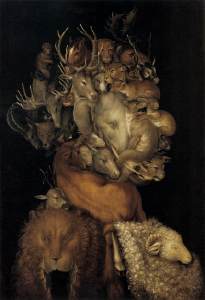Description
Giuseppe Arcimboldo's Earth painting is a 16th century masterpiece depicting the earth and its elements in a unique and fascinating composition. Arcimboldo's artistic style is characterized by his ability to create portraits using inanimate objects, such as fruits, vegetables, and flowers.
In Earth, Arcimboldo uses a variety of elements to represent the earth, including rocks, plants, and animals. The composition of the work is impressive, as each element is carefully placed to create a coherent and harmonious image.
Earth's color is another interesting aspect of the painting. Arcimboldo uses a variety of earthy and natural tones to represent the earth, creating a sense of calm and tranquility. In addition, the artist uses brighter and more saturated tones to highlight certain elements, such as flowers and animals.
The history of the painting is also fascinating. Earth was created in 1570 as part of a series of four paintings depicting the seasons of the year. The series was commissioned by Emperor Maximilian II of Austria and is currently in the collection of the Kunsthistorisches Museum in Vienna.
There are little-known aspects of Earth that are also interesting. For example, Arcimboldo is believed to have used live models to create the work, allowing him to capture the texture and shape of the elements more accurately. Furthermore, it is believed that the painting was created as a celebration of nature and its beauty, making it a work of art full of meaning and symbolism.

